Learning How To Eat
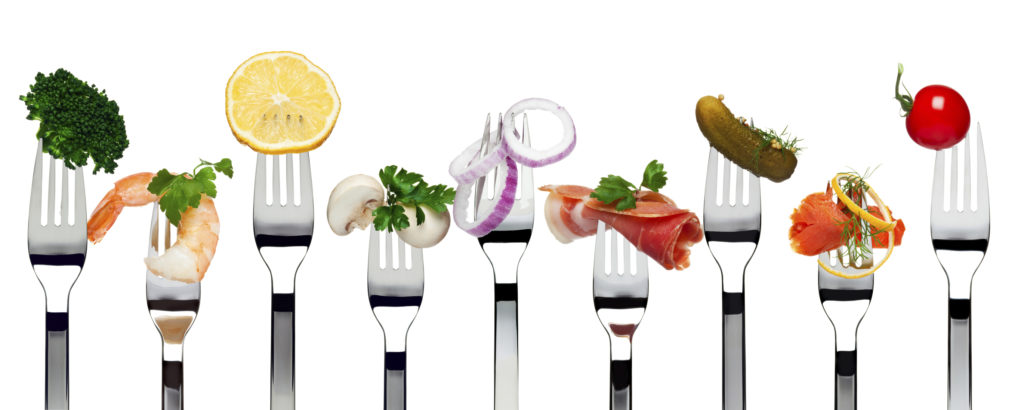 You’re probably saying, “I know how to eat. What’s she talking about?” I realize that this topic seems intuitive; we’re hungry, we find food, pick up a fork and eat. What do you mean: Learn How To Eat?
You’re probably saying, “I know how to eat. What’s she talking about?” I realize that this topic seems intuitive; we’re hungry, we find food, pick up a fork and eat. What do you mean: Learn How To Eat?
I’ve been a dietitian for over 34 years and a bariatric dietitian for over 17 of those years and have learned a great deal about how people eat. Eating patterns start early beginning with childhood modeling, family practices and later with cultural expectations. I’ll touch on these influences and how they affect our eating tendencies including how most of us use food for reasons that have nothing to do with hunger. I’m also going to share simple guidelines that can help us navigate our food culture in order to be healthy and more comfortable around food.
Role of Food
The role of food in each person’s life is as unique as their personality or their family dynamics. We all have emotional connections to food based on life’s experience and cultural expectations. Here are a few typical ways we use food in our daily life that have nothing to do with physical hunger.
Food As A Reward

Our culture teaches us from a very young age to use food as a reward; a parent might say, “If you eat all your vegetables, you’ll get dessert” or “Let’s get ice cream sundaes for your excellent grades”, suggesting that sweet treats are the best reward for good behavior. We all know where this pattern leads. Even into adulthood we’re conditioned to use food as reward. For example, when we accomplish something hard like completing a difficult assignment at work, getting through a busy day or finishing a big race we immediately go to food (and usually sweet food) to honor a job well done.
Food As A Stress Relief

For many folks, food is the answer to dealing with stress. This pattern often begins in times of high stress. As children we’re faced with feelings of low self esteem from comparisons or bullying. As young adults we’re challenged to find ourselves and become socially adept. As adults we’re expected to handle challenges from work and families with integrity and grace. Life is hard; we need ways to release and reflect. Enter food as a stress relief. Food is pleasurable, it’s immediate, it’s available, it doesn’t talk back, it gives us an outlet, it’s a welcome respite from the challenges of life. In my many years as a registered dietitian, stress eating is the number one cause of overeating.
Food As A Social Connection

We learn from a very young age that food connects people. We gather for meals because eating is one thing we all share in common. Parties are not complete without big spreads of food. Holidays, picnics, birthdays, sporting events . . . any social gathering usually features food front and center. It’s what we’ve come to expect. It’s part of our culture.
Healthy Eating Patterns
Taking inventory of how we use food in our lives and our emotional connection to food is crucial to making any changes we need to make in order to be healthier and happier. Obviously eating is necessary to sustain life; we can’t go without food. However, when our eating patterns become so out of sorts with what nature intended, when we use food on a very regular basis to satisfy the reasons to eat that have nothing to do with our natural signals of hunger and fullness (see above) and when these patterns lead to excess caloric intake and subsequent disease we MUST make changes.
Change is not easy. Most of our eating patterns begin in childhood which means we’ve been eating the same foods in the same way for the same reasons for a very long time. Here are few ideas to get you started on a new path toward healthier eating.
Slow Down
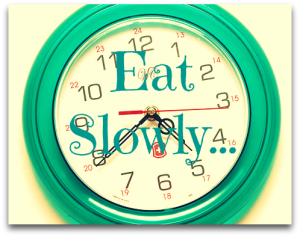
We live in a fast paced world where we expect things to be done now, maybe even yesterday. The pattern of eating quickly may have developed as a kid because if you didn’t eat fast you didn’t get your share of food or maybe your occupation demanded you eat fast like military or health care provider or hair stylist. This is a habit that needs to change. You will overeat if you eat fast. It takes 15 to 20 minutes for the chemicals in the body to respond to a full stomach. By that time you’ve eaten far more than your body needs. Put down your fork between bites. Talk more. Take small bites. Some folks even use small utensils like baby spoons or appetizer forks so that bites are smaller.
Listen to Your Natural Signals of Hunger and Fullness

I wrote about this topic a couple of years ago in a blog post entitled, “Mindful Eating: The When”, in a series of posts about Mindful Eating. I recommend you review all these posts for more in depth reading. In this particular post I talked about our natural signals of hunger and fullness. We’re born with these signals; they are regulated by hormones and chemicals produced when our stomachs are empty and full. The messages are clear, but we often ignore them. Watch a child eat. They know when they’re hungry; they cry for food. Then when they’re full it’s fork down, even in the middle of a delicious chocolate chip cookie; it’s clear they are done. How can we be more like our kids?
Start by paying attention to your signals. Check out the graphics above and below which provide a good guideline for us to follow. The goal is to stay within levels 3 to 7 throughout each day, avoiding undereating and overeating. Both extremes wreak havoc on the hormones that help us maintain a healthy weight.
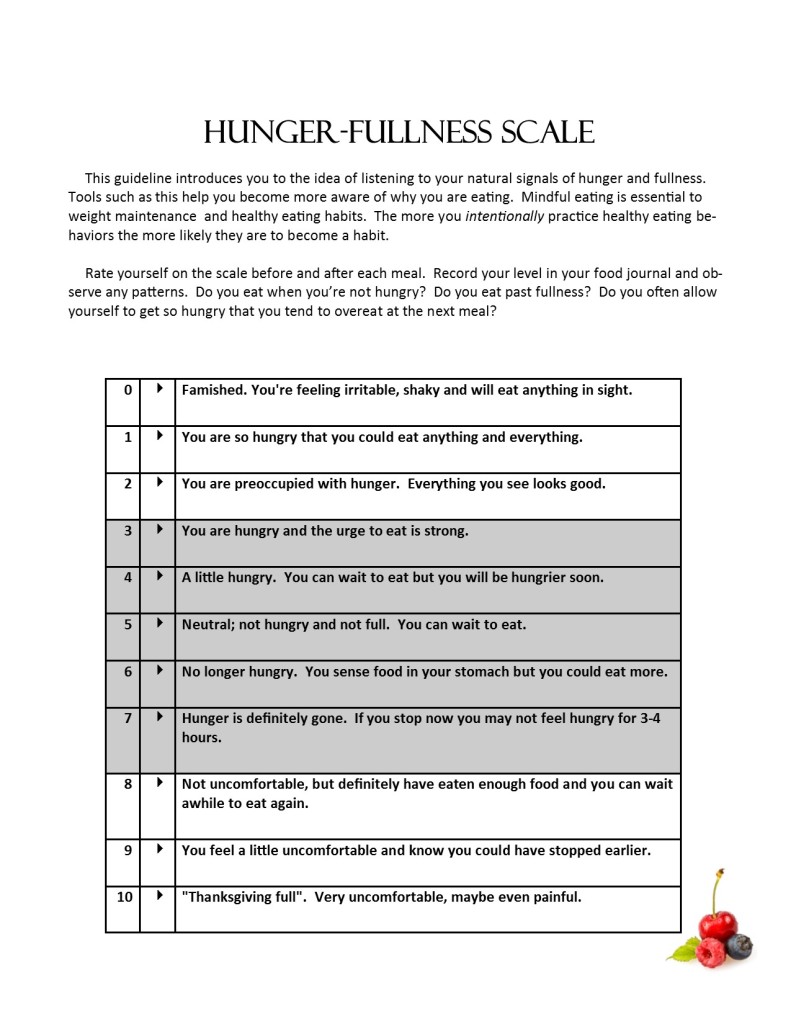
Food is More Than Just Taste
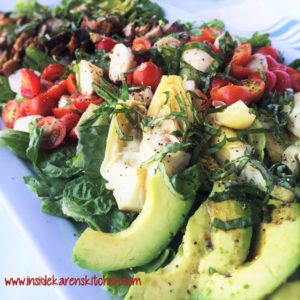
I admit that I return to a certain food if it tastes great to me. Our appetites are affected by flavor, no doubt. But there is more to an appetizing food than just taste alone. When all of our senses are heightened by food then we are more satisfied. Pay attention to the color of the food, the textures, the smells and even the sounds of the food. As all senses are employed you’ll likely eat less and choose healthier foods. Enjoy the total experience of eating, not just the taste. Try my Chicken Avocado Caprese Salad for a mind-blowing experience!
Avoid Using Food as a Stress Release
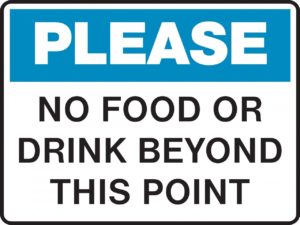
Be a fly on the wall now and then and watch yourself eat. Do you eat because you’re hungry or are you grabbing food in response to stress? Own your eating patterns and if you find yourself stress eating or wanting to stress eat, you need to stop and ask yourself, “Am I Hungry?” If the answer is “No”, then you need to ask, “What do I want this food to do for me?” Figure out the emotional void you’re trying to fill with food and choose a more appropriate response. Food is NOT the answer.
What we really want is a way to effectively deal with our stress not add more stress with foods we don’t necessarily need or want. Some of the most effective stress relievers involve physical activity. Go for a walk, ride a bike, do yoga, walk your dog, do push-ups, stretch. Other effective releases are service opportunities, counseling, chatting with a friend. How about handling every stressful situation like your dog?
 Whatever you choose, make sure it provides a way for you to unwind, reinvigorate, relax and/or distract you from the stress itself. Most of the time the thing that causes the stress does not go away so the only thing we can control is how we react to the stressor. Control what you can control and then forget the rest.
Whatever you choose, make sure it provides a way for you to unwind, reinvigorate, relax and/or distract you from the stress itself. Most of the time the thing that causes the stress does not go away so the only thing we can control is how we react to the stressor. Control what you can control and then forget the rest.
Practice, Practice, Practice
Learning how to eat, especially if you’re trying to replace some very bad habits requires a lot of patience and practice. Each day, each eating experience is an opportunity to practice your new habits. Eat slowly, listen to your natural signals of hunger and fullness, enjoy the total food experience and avoid using food as a stress reliever. I’d love to hear any of your success stories if you’re inclined to share them with me. Just email me at karen@insidekarenskitchen.com. Best Wishes!


Linda
Great post!
Karen
Thanks Linda. We all have to take inventory now and then to tweak or overhaul our eating patterns. We bring so many patterns from our childhood into adulthood and don’t always see how they effect our health. Hope this post was helpful. Karen
Anonymous
One thing I really need to work on is grazing when Im at home relaxing…doing laundry or have down time.
Karen
When we graze we’re not thinking about how much we consume or even what we consume, but rather it’s just something to do to keep us either from doing what we know needs to get done or just plain old boredom. Food is never the answer though. Rather if we eat balanced meals that satisfy us enough then we really don’t need to eat in between and will need to figure out more appropriate ways to deal with the boredom or whatever else is triggering the non-hunger eating cues.